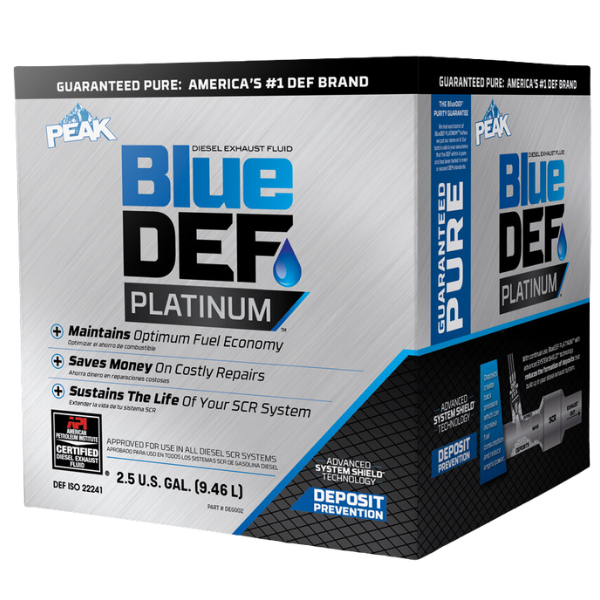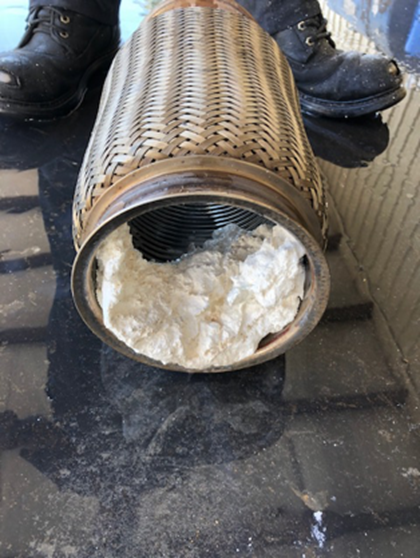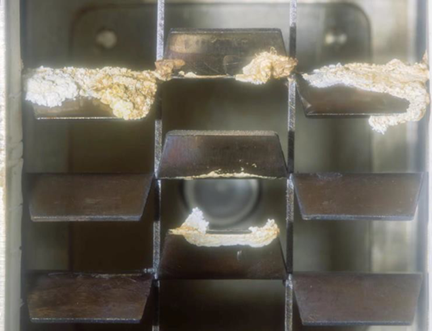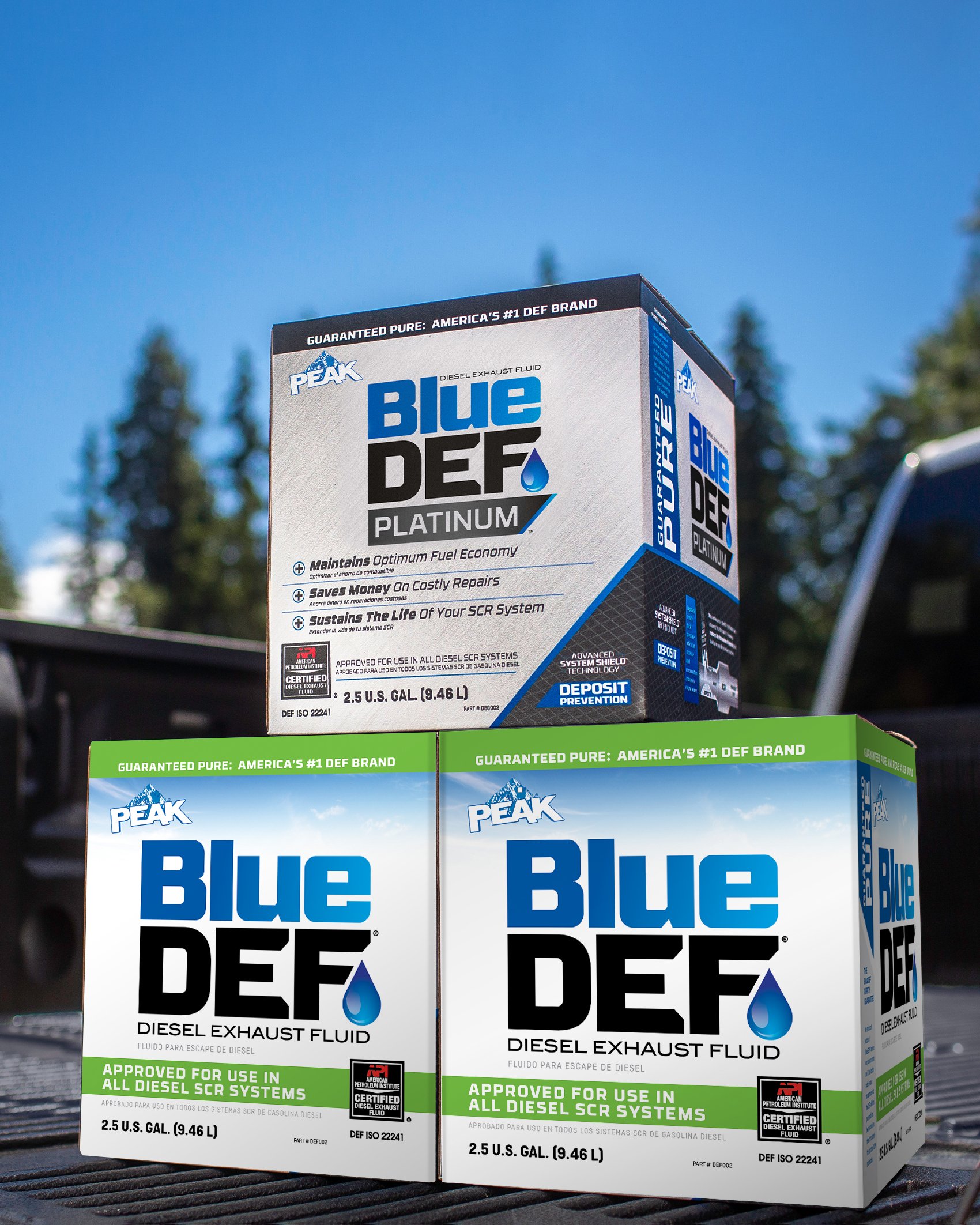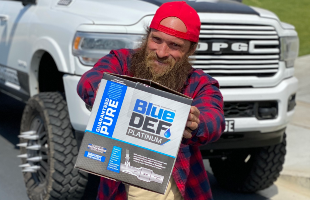
Ultimate Guide to Diesel Exhaust Fluid (DEF)
- Vehicle Maintenance
- BlueDEF
- August 25, 2023
Learn about the ins and outs of Diesel Exhaust Fluid.
Chances are, diesel exhaust fluid entered your consciousness back in 2010 when the EPA released the Diesel Emissions Reduction Act and mandated tighter emission standards to reduce air pollution. One extremely effective solution included the addition of a selective catalytic reduction system (SCR) that requires the injection of diesel exhaust fluid (DEF). A collective groan could be heard among diesel drivers, who understandably saw it as one more expense to tack on to the cost of diesel fuel itself.
Nowadays, DEF is an unavoidable reality, as any diesel vehicle built within the last six or seven years will shut down without it. But the benefits of DEF go well beyond its ability to reduce harmful nitrogen oxide emissions (NOx) by up to 90%.
The Upside: More Power & Fuel Economy
As manufacturers scrambled to figure out how to reduce emissions in order to meet the new government mandates, major advancements were made to diesel technology. Reducing harmful emissions, protecting the environment, improving human health and eliminating that unsightly black cloud spewing from diesel tailpipes is just the beginning.
Intake and exhaust tracks were fine tuned along with the development of selective catalytic reduction (SCR) systems, resulting in increased efficiency and output. Modern diesel engines now have more power and better fuel economy than ever before. Bottom line, thanks in part to the introduction of diesel exhaust fluid, today’s diesel engines have been optimized for power and economy.
So while it may feel like you’re shelling out more than you used to in order to buy DEF on top of your diesel, the reality is that you’re actually spending less overall than you would on an older, less fuel efficient diesel rig.
How Does DEF Work?
When injected into the exhaust stream of diesel vehicles, DEF turns harmful nitrogen oxides (NOx) into harmless nitrogen and water — naturally occurring compounds that are found in the air we breathe. Sounds simple, but the road to get here was anything but. Early efforts to meet tighter emissions standards involved messing with fluids in the motor itself (never a good idea), until engineers discovered that the best way to lower NOx levels was to treat the emissions after the combustion process.
This, of course, is made possible by the selective catalytic reduction (SCR) system, an exhaust after-treatment system into which DEF is injected via its own intake tank (separate from the diesel tank). As far as the fluid itself, it’s made up of a simple formula that consists of 32.5% urea and 67.5% deionized water.
See how the Diesel Brother break it down in under five minutes:
Is It Possible to Bypass DEF?
Let’s address the elephant in the room, shall we? What if you live in a state with no emissions testing? You may be tempted to remove the emission components and DEF-fuelled technology in an attempt to circumnavigate emissions regulations — while reaping the benefits of the improved power and fuel economy of new diesel engines. We wouldn’t recommend it, and for good reason.
First, if you are subject to emissions testing, you’ll never pass. But more importantly, deleting your DEF system is illegal. Take it straight from the EPA, “It is a crime to knowingly falsify, tamper with, render inaccurate, or fail to install any ‘monitoring device or method’ required under the Clean Air Act, including a vehicle's on-board diagnostic system.” And the fines for breaking the law are no joke.
And fine they will. Take the case of Rockwater Northeast LLC, a hauling service for the Pennsylvania oil and gas industry. Six people were charged for conspiring to violate the Clean Air Act when they modified the emissions systems on around 30 heavy-duty diesel trucks using aftermarket defeat devices. The company was forced to pay $2 million in fines, one individual was sentenced to six months jail time, and the others face hefty fines, probation and 50 hours of community service.
Beyond breaking the law, you’ll also void your manufacturer’s warranty, and will be unlikely to sell the vehicle in many areas where altered vehicles aren’t considered street legal. And then, of course, there’s the matter of the black diesel smoke billowing out of the truck and polluting the environment between 30 to 300 times more than a non-modified truck.
Storing and Handling DEF
It’s important to follow some general handling and storage guidelines to avoid contamination, and maximize the fluid’s shelf life.
-
Do:
Store DEF within a temperature range of 23-86o F to maximize its shelf life. Properly stored DEF can last for at least two years.
Keep your DEF container, nozzle, and tank-fill area free from dust, dirt and contaminants.
Cool overheated DEF by spraying the sealed container with water, or standing the overheated container in water.
-
Don't:
Pour DEF into the diesel tank, or diesel into the DEF tank.
Store DEF in previously used containers, or use non-DEF-dedicated equipment (such as funnels) to avoid contamination and adverse chemical reactions.
Store DEF in direct sunlight. The fluid can start to decompose at a minimal rate at 86o F. DEF that’s exposed to heat has a shelf life of about 1 year.
Add antifreeze to DEF. The fluid will freeze at 12o F with no harm. In your vehicle, the heat of the SCR system will quickly thaw the tank.
Mix DEF with water, oil, fuel or any other liquids.
What to Look for in Diesel Exhaust Fluid
While this two-ingredient formula may sound simple, it’s far from a DIY situation. The urea used in DEF is not the same as the commonly used product that’s found in fertilizer. The automotive-grade urea used in DEF is required to have a much higher purity, and is made synthetically from natural gas. The composition is included in ISO standard 22241, and is certified (in North America) by the American Petroleum Institute. So always look for packaging that includes both the API certification logo and reference to the product meeting the ISO 22241 standard for diesel exhaust fluid to ensure that it has been manufactured correctly, with the accurate formula.
Bottom line, all DEF is not created equal, as all too many diesel drivers have found out the hard way. Well-known brands such as BlueDEF® and BlueDEF PLATINUM® with Advanced SYSTEM SHIELD™ Technology are backed by in-house labs with strict standards that deliver peace of mind through extensive testing and evaluations to ensure that every batch of DEF is guaranteed pure and meets the highest quality standards. It’s just not worth rolling the dice to save a buck or two on a lesser brand.
Protect Your Investment
Peace of mind is priceless when it comes to a hefty investment like a diesel vehicle, especially if it’s tied to your livelihood. A lower quality DEF can wreak havoc on your rig, from poor engine performance to your engine shutting down.
If DEF is off-spec and not cleaning the truck exhaust as it should, a downstream NOx sensor will trigger a fault code and check-engine light (this will also occur if you run out of DEF). Worst case, the truck will lose power and grind to a halt. From trouble codes, to diagnostic time and repair expenses, it's simply not worth the risk or consequences, which include reduced fuel efficiency that can cost you a lot more in the long run.
Impure, or contaminated, DEF can also build up deposits in your exhaust system. This buildup becomes blockages that reduce the flow and volume of escaping exhaust gas. Your motor has to work harder to try and push the exhaust through the system, which requires more fuel, and negatively affects the performance of your engine.
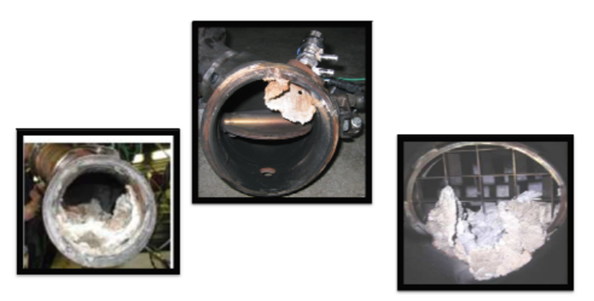

Why BlueDEF®?
OWI has built a reputation for producing the highest quality products since 1974, and we’re proud that BlueDEF® is America’s #1 DEF brand. Widely available at retailers, BlueDEF® is backed by a Purity Guarantee. Every single batch of BlueDEF® is tested extensively before it’s sold to you. The batch code on the packaging is your assurance that the DEF is pure, and has been tested to meet or exceed the strictest OEM standards.
Certified by the American Petroleum Institute to meet the ISO 22241 standard, BlueDEF® is made from the highest purity urea and deionized water, works in all diesel vehicles and equipment with SCR systems, and is non-flammable for safe and easy handling. Minimize risk, optimize your engine performance, and find true peace of mind with the highest quality DEF made by a premium, long-standing brand that America trusts.
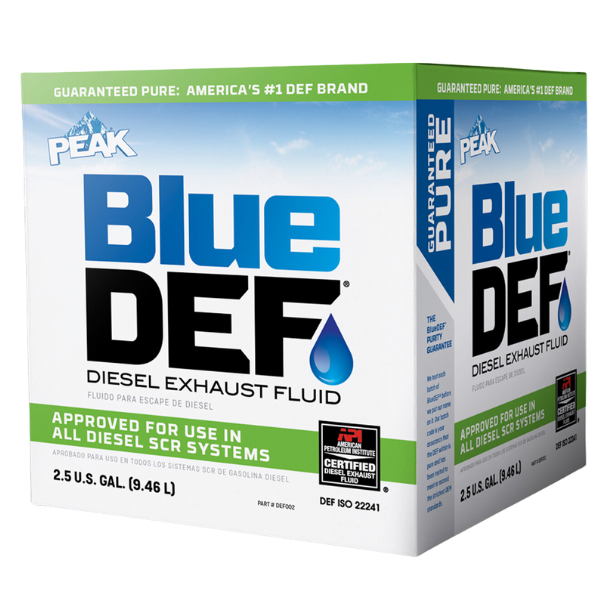

Is your Engine Susceptible to Deposit Formation?
In many cases, deposits are naturally oxidized during operation when exhaust gas temperatures reach 601°F. However, low-load vehicle operation, stop-and-go driving, extended idling, low speeds and cold weather can make it difficult for diesel vehicles to reach and maintain a high enough temperature to efficiently decompose urea through passive regeneration (translation: naturally eliminate deposits).
For those reasons, the following types of vehicles may be susceptible to deposits:
- Buses and coaches
- Recreation vehicles
- Class 8 trucks
- Agriculture and construction equipment
- Refuse / waste management vehicles
- Light-duty and medium-duty trucks
Deposits that build up in diesel exhaust systems create back pressure that can increase fuel consumption and reduce engine power. Once residue collects, it cannot be removed and over time can lead to costly repairs, or even the replacement of your SCR system.The industry has been trying to tackle this issue for more than two decades, but solutions were too complicated, or too costly — until now.
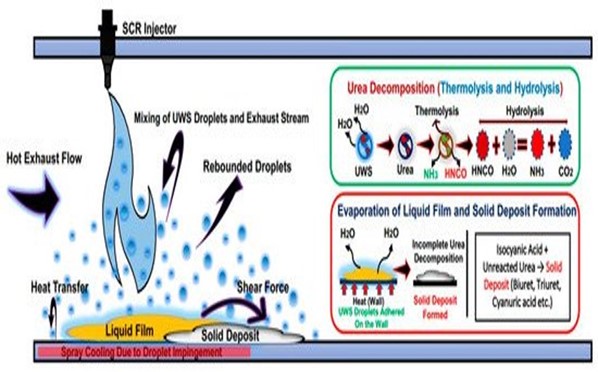

Prevent Buildup with Groundbreaking BlueDEF PLATINUM®
BlueDEF PLATINUM® with Advanced SYSTEM SHIELD™ Technology is a groundbreaking premium diesel exhaust fluid made with a proprietary additive package that significantly reduces the formation of deposits to protect your investment.
This performance can help you:
- Reduce future deposit buildup with continual use
- Maintain optimal fuel economy and power
- Save money on costly repairs
- Sustain the life of your SCR system
BlueDEF PLATINUM® is the only atomized DEF on the market with the ability to prevent deposits from forming. America’s #1 brand of diesel exhaust fluid conforms to ISO-22241-1 specifications for DEF, and is certified by the American Petroleum Institute (API).
Keep your vehicle running at peak performance, and eliminate the risk of harmful deposits with the most advanced DEF on the market. Put some trust in your truck. Rely on Guaranteed Pure PEAK BlueDEF® or BlueDEF PLATINUM® with Advanced SYSTEM SHIELD™ Technology to keep your diesel truck running strong and long.
